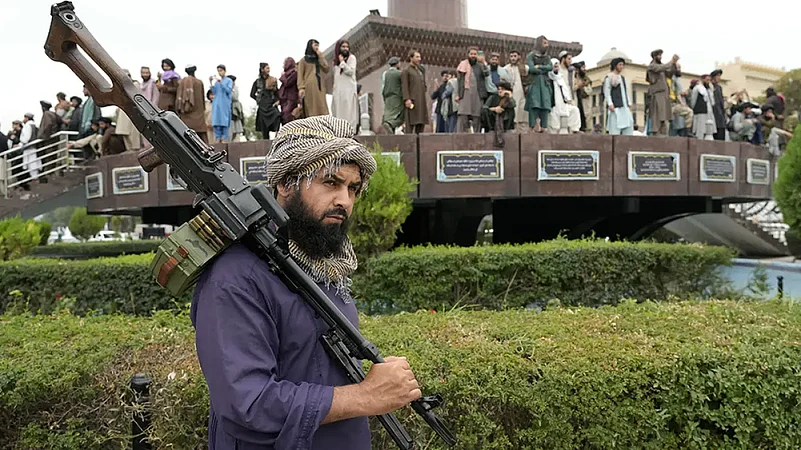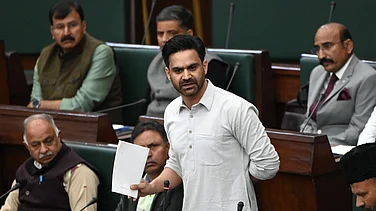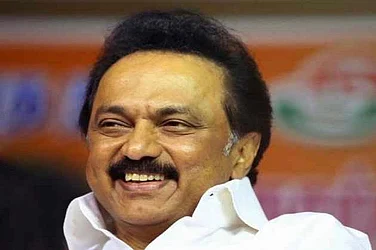In 2015, Prime Minister Narendra Modi during inauguration of Afghanistan’s brand new Parliament building in Kabul, hummed lines of famous Bollywood song aloud: ‘yaari hai imaan mera, yaare mere zindagi’.
Modi chose ‘Zanjeer’ movie song to describe the India-Afghanistan bonhomie of nearly the last two decades. The Afghan Parliament building built at a whopping cost of 90 million dollars, was the latest in the long list of India’s investment in the war-torn country, post-2001 invasion of Afghanistan by US.
That was until August 2021 when the Taliban came to power in Afghanistan. Since then, India has remained skeptical about maintaining ties with Afghanistan, considering its rather unpleasant history with Taliban.
Now, the Taliban has urged India to invest again in Afghanistan. The request came at a recent meeting with the head of the Indian technical mission in Kabul. There have been reports that Taliban is keen on India investing in Afghanistan.
India has not taken a call on the request given the security situation in Afghanistan, even as it maintains engagement with the regime in Kabul.
It is not like India has completely cut off ties with Afghanistan’s new regime. It has donated consignments of humanitarian assistance to the country including 40,000 metric tonnes of wheat, about 50 tonnes of medical aid consisting of essential lifesaving medicines, anti-TB medicines, 500,000 doses of Covid-19 vaccine, essential medical and surgical items and 28 tonnes of other disaster relief material.
Why Taliban Wants India To Invest In Afghanistan
India had been heavily investing in the country over the past years and its ties with Afghanistan have been of geopolitical and strategic significance in the South East Asia region.
India has helped build infrastructure in Afghanistan which was in turmoil following the Red Army takeover, subsequent war lord frenzy, and Taliban period from 1996 to 2001.
India has contributed to the building of roads, dams, hospitals and schools in Afghanistan. Its investment in Afghanistan until Taliban takeover is estimated to be over 3 billion dollars. Afghans have appreciated the help and relations between the two nations have been of bonhomie and mutual respect since the 2000s.
In 2011, India signed Strategic Partnership Agreement With Afghanistan to build its infrastructure, education, investment and duty free access for Afghans to the Indian market.
India’s Dream Projects In Afghanistan:
Salma Dam: Also known as the India-Afghanistan friendship dam, the 42 MW dam is located in Herat province. It was started in 2016.
Zaranj-Delaram highway: This 218 kilometer is highway is significant, since it allows India access to landlocked Afghanistan through Iran’s Chabahar Port. The highway assumes significance considering Pakistan’s blanket ban overland on India for doing trade with Afghanistan.The highway has been built by India at 150-million dollars.
Historical Stor Palace: The19th century place in Kabul was rebuilt by India and inguarted by PM Modi in 2016.
Besides, India has built the country's electricity infrastructure. The notable addition is the 220KV Pul-e-Khumri transmission line from Baghlan province to Kabul. India has also built hospitals and beefed up the country's transport system.
India's projects which are on halt in Afghanistan
India has announced that it would construct Shatoot Dam in Kabul district, which would provide safe drinking water to 2 million residents. India has also announced 1 million dollar package for the Aga Khan heritage project, the restoration of the Bala Hissar Fort south of Kabul, whose origins go back to the 6th century.
In 2017, New Delhi and Kabul opened a direct air freight corridor, which boosted the trade between the two countries.
Why is India sceptical to work with Taliban in Afghanistan?
Investing in Afghanistan helps India safeguard itself from potential terror attacks launched on Indian soil from Afghanistan by anti-India forces. India has also been accusing Pakistan of backing militants in Afghanistan as proxies against India.
India has also been critical of the Taliban, whom it considers close to its regional rival, Pakistan. However, Taliban has hinted that it would like to have good ties with all regional countries this time around.
The most important troubling question for India this time when investing in Afghanistan would pertain to Taliban's backing of the hijackers of an Indian Airlines flight in 1999. The haunting memory still lingered in the memory of most Indians.
Infamous Kandahar hijacking in 1999:
Indian Airlines flight, IC-814 air bound from Kathmandu to Delhi with 179 passengers including 24 foreigners and 11 crew members on board was hijacked by five masked men on December 24, 1999.
The flight was made to land at Amritsar, Lahore and then UAE for refuelling. It was before the hijackers finally took IAF plane to Kandahar in Afghanistan. The hijackers had left the plane in Kandahar with a Taliban hostage to ensure their safe escape.
Following several rounds of negotiations, the Indian government led by Atal Bihari Vajpayee gave in to the demands of the terrorists and released their three men lodged inside an Indian jail.
The released men included Jaish-e-Mohammad's Masood Azhar, Omar Sheikh and Kashmiri militant Mushtaq Ahmad Zargar, who were taken by then External Affairs Minister Jaswant Singh on a special plane to Kandahar.
The hijackers had also murdered a passenger, Rupin Katiyal.


























